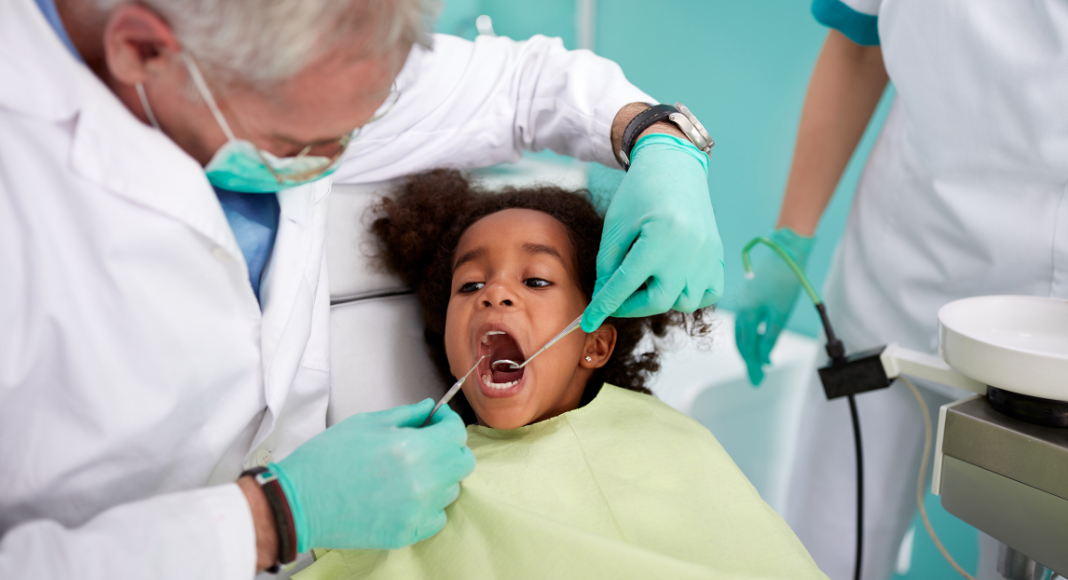Teeth are a divisive topic. It seems to be that you either love going to the dentist (yes, those people do exist) or you absolutely dread going to the dentist. Regardless of how you personally may feel, as a parent, you don’t want your child to be apprehensive about dental visits. There are steps you can take to help make their first visit and every subsequent visit tolerable (and maybe even help shape them into that person who just loooooves going to the dentist).
First, understand that the dentist of today isn’t necessarily the dentist that you remember from your childhood.
Dental technology has come a long way. Additionally, the dental profession as a whole has moved toward a more caring, less patriarchal mindset. Dental offices are now more about comfort and giving you more treatment options. Pediatric dental offices really go above and beyond, with additions like murals, playsets, or arcade games. Your child’s comfort is usually one of their top goals. If the patient is comfortable, it’s a better appointment (and day!) for everyone.
Second, as a parent, be a good example.
Kids are always watching and absorbing (pesky little sponges). Use positive terms while talking about the dentist and dental appointments. If you need dental work, let your child sit in the room to observe how it’s so not a big deal at all. Conversely, if you personally have dental anxiety, then don’t bring your kid to the appointment. That seems like common sense, but there have been so many times that a parent has brought their child, the parent has been anxious or nervous, the child observes that, and then the child ends up “inheriting” their parent’s fear.
Let the dentist control the dialogue and conversation.
Don’t try to talk over them or interject, even if you think you’re helping. Of course, if you have questions or concerns, do bring them up. But the dentist and their team practice using very specific terminology (or avoiding certain words and phrases) to allow the most comfort for your kid. So don’t undermine them by saying things like, “Don’t be scared,” or “Be brave! You can do it!” (A kid’s mind instantly goes, “Why would mom say that? Is there something scary? Why would I have to be brave?”). You can prep them a little for the appointment (the dentist is going to make your tooth sleepy and then fix it so it’s shiny), but avoid specifics so as to allow the dental team to explain to your child with their chosen verbiage and terminology. The point isn’t to trick your child, of course, but to prevent unnecessary anxiety.
Get your child to the dentist early!
There are two big reasons for that. First, the earlier they start, the quicker they will get used to coming to the dentist (especially if the visit is just a super fun dental cleaning). Secondly, if there are any dental issues, like cavities, the dental team can catch them early when your child may just need a small filling, as opposed to more invasive work like crowns or extractions.
In addition to starting dental visits early (recommendation is by age 1), provide good oral hygiene at home.
I often tell my patients, “I don’t go home with you, so I can’t control what you’re eating and drinking or whether you’re flossing. That’s completely on you. I can do everything in my ability to give you impeccable dental care, but at the end of the day, you do more to influence your teeth than I do.” The same goes for your kids. Daily habits go a long way. Make sure you’re brushing your kids’ teeth (the ADA recommends fluoride toothpaste) for a full 2 minutes twice a day, and children should absolutely be flossing between their teeth. Be mindful of sugar, especially “sneaky” sugar juice, sweet tea, granola bars, dried fruit, gummy vitamins, or carb-heavy foods like Goldfish crackers or bagels. If you can keep their needed dental work to a minimum, then almost every appointment can just be a super fun cleaning.
Last, respect the dentist’s decision when it comes to treatment plans.
If the dentist is referring your child to a pediatric dentist, it isn’t because they personally don’t want to treat your child. It’s because the specialist can use different equipment or behavior modification techniques to make the appointment easier for your child. If they are recommending sedation, it isn’t because they think your child is difficult. It’s because they don’t want your child to go through several appointments and start to have a negative association with the dentist. They’re recommending it so that your child only has to go through one big appointment one time where they likely won’t have any memory of it. At the end of the day, the dentist is just doing what’s best for your child and their individual situation.













